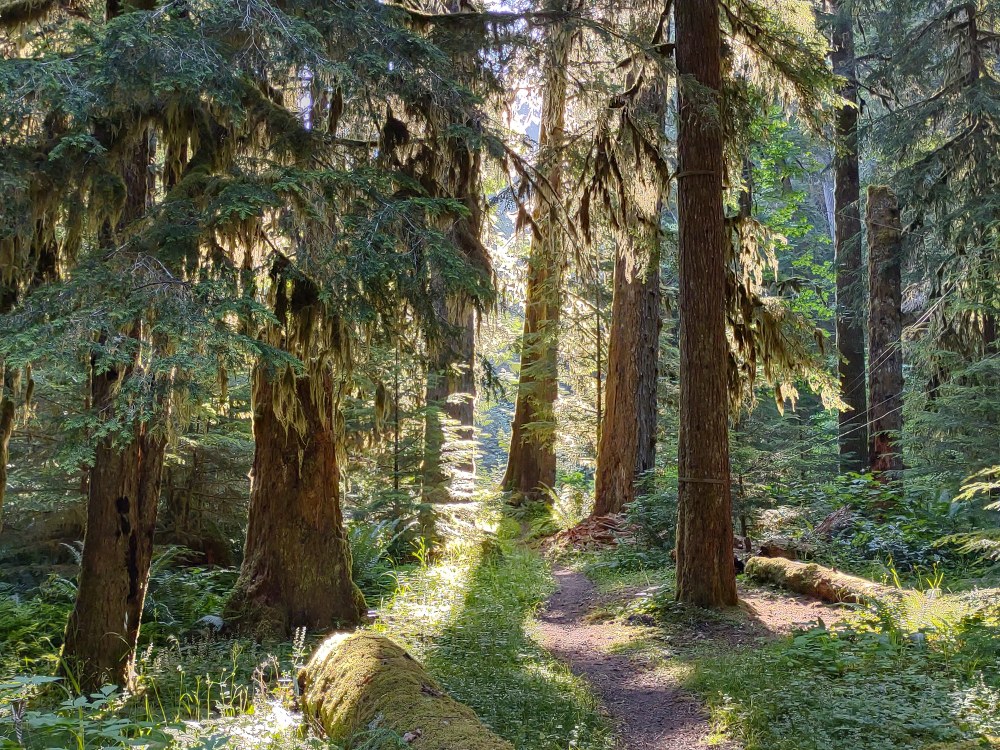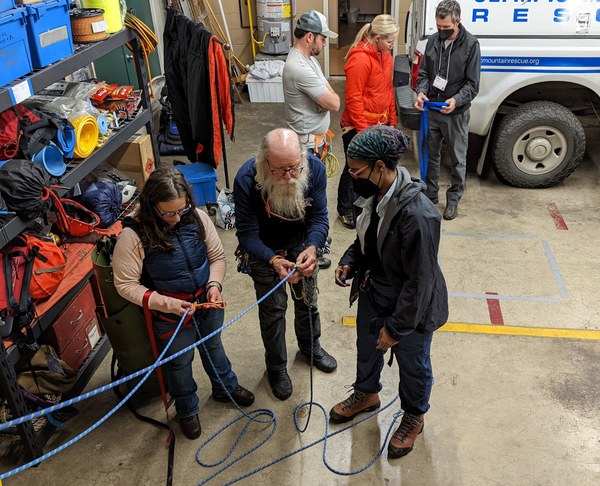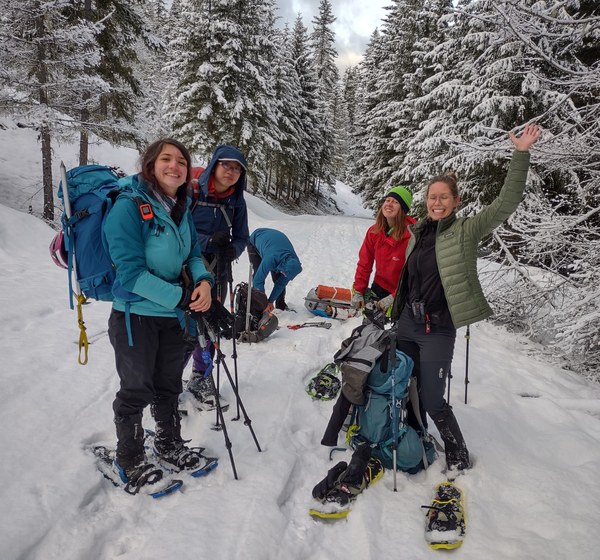
Recently, my partner and I helped teach the Kitsap Alpine Scrambling Course. We began class with an icebreaker question: “When did you fall in love with the outdoors? And if you’re not sure you’re in love yet, when did the outdoors start to call to you?” The responses varied, and even though we came from vastly different backgrounds, we found we had as much common ground as we had differences. This icebreaker served as an introduction to our 20-minute module on Diversity, Equity and Inclusion (DEI). We continued our conversation by asking a question, in some cases considered the question, then talked about other ways we, as leaders and students, can help foster a culture of belonging for ourselves and each other.
The question: “Why are we talking about diversity, equity, and inclusion? We are outdoor enthusiasts! Let’s just go outdoors!” (The snarkier among us might lob, “Trees don’t care what color/religion/gender/orientation you are.”)
Many will assume the question is defensive, oblivious, or intentionally harmful. And while questions like these have been used to hijack conversations, spew hate, etc. they can also offer an interesting point of discussion. So, let’s answer it.
Why DEI in an outdoor recreation club?
We choose to talk about DEI (The Mountaineers refer to our work internally as Equity & Inclusion or E&I) in several of our courses because study after study shows spending time outdoors is good for our bodies and minds. As outdoor recreationists and as an organization, if we can lower barriers to the outdoors, we might have a positive impact on the health of our fellow humans. An overwhelming amount of data show:
- The outdoors can have a preventative and curative effect on our health.
- Certain communities, including under-resourced communities and communities of color, have not had access to the outdoors, or have found the outdoors to be an unwelcoming or hostile place.
- All communities are healthier when all communities are healthier.
The Mountaineers mission, along with our vision to create a community where all people feel belonging, has us well positioned to support outdoor access for more people. While we can’t solve all social issues, including existing health disparities along racial and socioeconomic lines, the three points above are why we in The Mountaineers need to care and take action.
 Kitsap scramble students and instructors practice fixed line travel (before our DEI presentation).
Kitsap scramble students and instructors practice fixed line travel (before our DEI presentation).
A cultural shift
While it’s true that the trees don’t care about your identity, other people do. Outdoor culture is a micro-community in the greater society, and everything that happens in this community affects all of us. Some racial groups in recent history have been encouraged to use the outdoors - for exercise, recreation, peace, solitude, family time, and personal goalsetting - while others have been shunned or scared off the land. For many groups, the outdoors was a place where bad things could, did, and still happen.
I personally believe all people should have access to fun, exciting, tranquil, and challenging outdoor experiences and the health benefits they provide. And The Mountaineers has committed to this as well, so it’s important for us to talk about DEI in our courses and for us to create a learning environment where everyone feels emotionally and physically safe.
Caring for the land as well as the people
In addition to caring for our health as individuals and a society, we also improve the health of the land when more people find value in it. If I don’t know something exists or it’s not open to me, I’m not likely to care about it.
The future of our organization and the natural world depends on all of us caring what happens to our planet and fostering that love in future generations. And yet no one is going to dispute that more people means more impact on the environment.
Most Tribes, land agencies, and environmental organizations agree that welcoming new folks into natural spaces and preserving those spaces for the future will require diplomacy and finesse. Here too, The Mountaineers has a role to play. We can teach people to tread lightly, be kind, and leave the land better than we found it, especially as our numbers grow.
Those of us who have been outdoors for 10 (or 20 or 30+) years have a special role to not play, the Leave No Trace (LNT) police. We need to stop shaming people for being new and cutting a social trail, leaving microtrash, or cranking tunes. We need to help people understand the importance of trail etiquette and foster a strong relationship with nature through experience and education.
As one example, music on the trail sans headphones is not inherently bad, but it won't help a male bird find its mate - or help a baby bird find its mama. Music can be okay sometimes to deter bears and cougars, just not too loud because you’ll want to hear the bushes rustle before you see glowing eyes and big teeth or claws.
Approaching LNT as education, with a bit of humor and positive reinforcement and not as a moral judgment, is a win-win. It's critical to making people feel welcome, and it's also the best way to raise good stewards of the land.
Relearning the language we use
Our language is changing. If you don’t believe me, check out Oxford Online. We can accept it, or the younger generations will just have to wait for us to die out. In my experience it’s easier to relearn than you might imagine. Here are a few lessons I’ve picked up over the years:
- A carabiner is a carabiner is a carabiner. That is not up for debate. We now say locker/non-locker, which is actually more helpful when people are digging through their racks.
- When we huddle up, we don’t say “pow-wow” and we don’t say “off reservation” to mean cross-country. I learned this the hard way.
- When trying to move people along or pick up the pace, for the love of all that is good, don’t use terms like “slave driver” or “crack the whip.”
- “They” is a singular pronoun for a person who identifies as transgender or nonbinary. What your seventh grade English teacher taught you is now irrelevant.
Here’s the kicker with language: we need to assume people have good intent, even when they mess up. We should still challenge outdated language and microaggressions and we should always recognize and apologize for hurt that was caused, but we must remember that everyone is human.
People use language habitually and sometimes need to be reminded when they’ve erred. It’ll serve us well to keep in mind that a reminder isn’t a slap in the face. It’s an opportunity to grow. Many middle-agers complain that our brains are going soft. Continuing to learn keeps us alive and helps stave off dementia. And who doesn’t want that?
Finding common ground
In taking steps to create a culture of belonging, we can achieve a deeper appreciation for those shining moments that every hiker/climber/scrambler/paddler remembers. When we’ve been out for 15 hours, or three days, we all stink and half of us are having stomach issues. We're cold, wet, bug-eaten, and sick of our snacks and freeze-dried meals. Maybe a few of us are sitting at the base of a mountain thinking, “There’s no way I am getting up that thing!”
In those moments, we're one team supporting each other’s success. We feel each other’s struggles. The small talk falls away. The things that divide us fall away. Those moments give us a tiny glimpse into what a peaceful existence might look like. And it is incredibly beautiful.
 The coolest groups include people with international backgrounds, like this scramble with folks from Iran and Malaysia.
The coolest groups include people with international backgrounds, like this scramble with folks from Iran and Malaysia.
Main image by Meryl Lassen.
Add a comment
Log in to add comments.Thank you for this blog post, Meryl, and for reminding us that open hearts and open minds are valuable tools to have in our kit.
 Meryl Lassen
Meryl Lassen